Sport and Prose in Kerry Howley’s Thrown
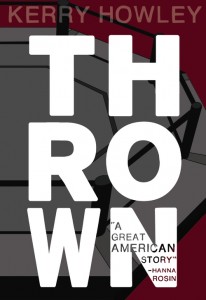 Thrown
Thrown
by Kerry Howley
Sarabande Books, Oct. 2014
288 pages / $15.95 Buy from Sarabande Books and Amazon
I had no sight into Daisy’s heart, but I felt that Tom would drift on forever seeking, a little wistfully, for the dramatic turbulence of some irrecoverable football game.
— F. Scott Fitzgerald
Gravity forgot me. I was the goalie in a pick-up soccer game in high school. My friend kicked a beautiful curling shot from just beyond the eighteen meter line; a quality of kick that elicits sharp breaths from attentive spectators. I jumped, deflected the shot over the cross-bar, and then. I was just. In space. Weightless. Drifting. Orientationless. Or rather, what orientation I had shuffled realms of sensing, considered foreign methods of angle and duration. I couldn’t tell you where I was or how I got there.
My back slammed onto the ground. The angle of my jump, the force of the shot, my singular focus on making the save, and my lack of expertise in such moments combined to turn me horizontal in mid-air. My body dispersed, but a bound self persisted enough that I vividly remember this instant of free-fall.
Many people, through many routes, have pursued similar fleeting moments; moments when nothing needs to make sense and nothing needs to be sensed because we have been removed from the mundane requirements to sense and make sense. Depending on the tenor of your philosophy, you might call this phenomenon “enlightenment,” “nirvana,” “losing yourself,” “bliss,” or any permutation, step towards, or variant thereof. Kerry “Kit” Howley might call it “ecstasy” or “ecstatic experience;” a specific usage of the term drawn from Schopenhauer and phenomenology.
Thrown, Howley’s chronicle of the pursuit of this “ecstasy” is The Great Gatsby from Gatsby’s perspective, but instead of a beautiful woman with whom the fresh potential of young love was shared, Howley courses an experience of hyper-aware ecstasy that Kit stumbled into first while escaping a beigely debilitating “conference on phenomenology, where a balding professor stunningly wrong about Husserlian intentionality dominated the postconference cocktail hour.” (p3) Kit, “[h]aving nothing to do in Des Moines beyond explore Husserl with nonsmokers who did not understand him[…]walked the conference hallways,” until she encountered this moment of ecstasy in a Mixed Martial Arts (MMA) match featuring Sean Huffman. Soon after, she encountered that experience again through the martial efforts of Erik Koch. Then Kit pursued that ecstasy through thousands of miles of travel, months of stagnation, and unsatisfying moments, even abandoning her own philosophy degree. And she pursued without waver, without doubt, and with a rare prose confidence. I’ll say this now because other themes and ideas will pull me away from this moment, because there are questions of narration and “fiction” I will not answer, because I’m a person and so will grapple with the ideas that connect to my emotions, because there will not be another chance, and because it is thrilling to say this; very few works of contemporary anything compare to the opening chapter of Thrown.
This is Howley’s ecstasy from Erik:
This moment lasts for days. We can only open our mouths in a united wordless moan. We are each of us simple tools of perception, free of the cloudying intellect, allowed a thinking of the body only accessible when men like Erik can[…]lead us outside ourselves. (p175)
And her ecstasy through Sean:
You’re not supposed to be able to live here, at this pitch, for more than a moment. But Sean, again and again, finds a way to stretch that single moment of ecstatic bliss into minute upon minute of blood-borne release. He is escaping through the slice in his forehead, the knuckle-cuts, the rip down the line of his nose, and it is possible to believe for fifteen short minutes, that we’ve found a way out. (p155)
October 6th, 2014 / 10:00 am
His Geography: The Collected Works of Michael Ondaatje
A. “There are stories the man recites quietly into the room which slip from level to level like a hawk.”
The English Patient

1. A popular mistake about Canada is that it is fundamentally North. Otto Friedrich’s biography of Glenn Gould compares Canada’s relationship to the North with America’s to the West, except there’s no Disneyland in the Arctic. Most of Canada’s population is concentrated in the southernmost quarters; post-Gould Toronto produced Petra Collins’ Instagram, among a lot of other non-Drizzy things. One quarter of all postwar immigrants to Canada came to Toronto. Canada’s history is only one centennial in; its youth relative to the rest of the world may account for why the rest of the world sometimes acts so strange about it. Cats still aren’t sure about humans because in evolutionary terms they haven’t been around as long as dogs and are still socializing themselves. There are no cats in the Bible, for instance.
2. The book of 2014, nonfic anyway, was Capital in the 21st Century by Thomas Piketty, a book carrying the mythical glow of pregnancy. Stephen Marche reviewed it for the Los Angeles Review of Books, calling it ‘perhaps the only major work of economics that could reasonably be mistaken for a work of literary criticism.’ He relates realism’s utter defeat of the other forms, the fun ones like lyricism or even minimalism, and credits Jonathan Franzen, that old serpent, with its proliferation. We already knew all that. One of the writers Marche suggests has fallen out of usage is the Canadian Michael Ondaatje: from Ontario by way of Sri Lanka, educated in England, known for hushed, haunted pieces like The English Patient (1992), Divisadero (2007) and The Collected Works Of Billy The Kid (1970). He also wrote a memoir, Running In The Family (1979), which includes the following clip:
“At St. Thomas’ College Boy School I had written ‘lines’ as punishment. A hundred and fifty times. [fragment in Sinhalese] I must not throw coconuts off the roof of Cobblestone House. [fragment in Sinhalese] We must not urinate again on Father Barnabus’ tires. A communal protest this time, the first of my socialist tendencies. The idiot phrases moved east across the page as if searching for longitude and story, some meaning or grace that would occur blazing after so much writing. For years I thought literature was punishment, simply a parade ground. The only freedom writing brought was as the author of rude expressions on walls and desks.”
3. Ondaatje’s family is Dutch-Ceylonese and was well-off. By various vagaries his father ended up a chicken farmer, his mother on staff at a hotel, and he and his siblings diffused thru England, America, and Canada. Much of his writing is liminal: the act of falling on a map, and why is it called falling? ‘We are the real countries’, vows a character in The English Patient. Disdain for colonialism and its legacies is a chief Ondaatje engine; another character in The English Patient insists that everyone white is motivationally English: ‘when you are bombing brown races you are an Englishman’. That character’s name is Kim and he’s Sikh, which we know because he wears a turban. Almasy, the sophisticated count burned into patienthood if not Englishness, is Hungarian but nomadic. He hates ownership, being owned—and the idea that when there’s a war on, where you’re from becomes important.
Ondaatje produces fantasias of language, requiring much suspension of disbelief, risking collapse if pulled too far out of context. As stated by Pico Eyer in an essay for the New York Review of Books called ‘A New Kind of Mongrel Fiction’: ‘ there will always be some for whom Ondaatje is too rarefied or exquisite.’ Lines like ‘giraffes of fame’ and little leashes of them like ‘later my hands cracked in love juice/fingers paralyzed by it arthritic/these beautiful fingers I couldnt [sic] move/faster than a crippled witch now’ qualify as sentimental dithering to the worst agnostics. Glenn Gould said he believed in God as long as it was Bach’s; I believe in a groundless, fermented prose style as long as it is Ondaatje’s. Even when it’s a little bit bad, it is never not beautiful.
‘There is nothing wise about a harbor, but it is real life. It is as sincere as a Singapore cassette. Infinite waters cohabit with flotsam on this side of the breakwater and the luxury liners and Maldive fishing vessels steam out to erase calm sea. Who was I saying goodbye to?’
Ondaatje, Running In The Family
October 3rd, 2014 / 10:00 am
25 Points: Matt Meets Vik
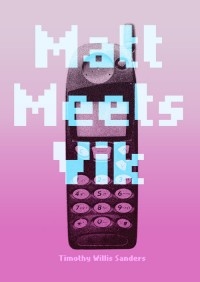 |
Matt Meets Vik
by Timothy Willis Sanders
Civil Coping Mechanisms, 2014
164 pages / $13.95 buy from Amazon
|
Or ‘Rich Meets Vik’ to review ‘Matt Meets Vik’ as Richard Brammer teams up with his girlfriend ‘Vik’ (Victoria Brown) to review this book.
1. Vik: At the end of the book, I didn’t expect it to be the end and kept turning (scrolling) the pages thinking there would be another chapter. When I realised that it was the end I was pleased at the way it ended.
2. Vik: I’m a woman so I don’t often get to hear a man’s raw thoughts. I liked that this book put me in the position to see male thoughts. I assume that they are real-ish male thoughts.
3. Rich: Shit! I haven’t started reading the book yet. I’m going to read it and find out. I’m not sure but I think I have real-ish male thoughts to compare them to, as a scientific control.
4. Vik: The book is set when Snake was a big deal on Nokia phones. I never had a Nokia, but I remember the enthusiasm Nokia owners had for Snake.
5. Rich: I had one of those Nokia’s. Before that I had a Nokia 5410 or something (in about ’95 and this was before my impoverished dispersed family had a house phone even). I loved Snake though. I was as addicted to Snake as I could’ve been to anything 2-dimensional at that time. I used to commentate to myself about my own performance on Snake like it was a sport and I was a great renowned competitor.
6. Vik: Actually I did have a Nokia phone but it was such an early Nokia that it didn’t allow you to access your address book when typing a text message so you would have to memorise the phone number of the person you wanted to text when texting. Which was terrible.
7. Rich: Shit! There’d be v apathetic riots if technology was designed like that now. My first phone had a text facility but the network ‘didn’t support it’. Should we review this book now?
8. Vik: I read this book in about 4 sittings; it is 177 pages long. I read it really quickly.
9. Vik: I’m a woman named Vik but I didn’t identify that much with the character named Vik, in fact I identified as much with the character named Matt as I did with Vik.
10. Vik: There are other characters, Chantelle, Ralph, Lucas and Esme and maybe some more.
October 2nd, 2014 / 12:00 pm
25 Points: Wolf in White Van
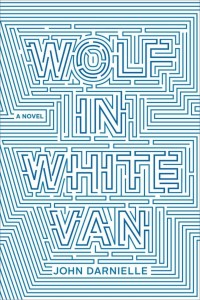 |
Wolf in White Van
by John Darnielle
Farrar, Straus and Giroux, 2014
224 pages / $24.00 buy from Amazon
|
1. I don’t like writing. The actual act of writing, I mean. It’s hard to get started. Just getting this first of twenty-five points written took longer than the next twenty-four.
2. I like better having written, when there’s a mess of text on the page to play with. It’s not really creating anymore at that point; it’s discovery, exploring. Moving around in it and finding what I might have missed the first time.
3. John Darnielle’s Wolf in White Van is a book about a lot of things. Mostly, though, it’s about exactly this kind of discovery and exploring that appeals to me. Discovery through text, exploring between your ears. Imagined mountains, dreamt-up spaces.
4. “It gets so lonely living inside your own head,” writes the narrator, as way of explanation for having dreamt up one particularly dangerous space. The book centers on this hero’s reasons for—and the consequences of—dreaming up a game called Trace Italian.
5. Trace Italian is a by-mail role-playing game of sorts. “The way you play Trace Italian,” the narrator tells us, “seems unbearably quaint from a modern perspective, and people usually don’t believe me when I tell them it’s how I supplement my monthly insurance checks, but people underestimate just how starved everybody is for some magic pathway back into childhood.”
6. “A magic pathway back into childhood” is a better way of describing what this book is about. Memory, remembering. Finding the path back to a place where anything is possible.
7. It’s just the kind of book I like best.
8. I’m so glad this book isn’t called Trace Italian.
9. The “monthly insurance” checks the narrator mentions in point 5 above are part of the mystery of the book. What exactly happened that led this person to create a game and collect insurance checks? What caused him to live sequestered from the world? Why does he order swords from a catalog? Real, honest-to-god swords?
10. Players begin Trace Italian by sending an SASE to a PO Box and receiving in turn a sheet of paper telling them where they are in the imagined world. It’s a post-event world of sorts; they must traverse a landscape toward an end goal, the Trace, where they’ll find safety from the bad things that have taken over.
September 30th, 2014 / 2:50 pm
In Defence of 4chan
There’s a message being conveyed by mainstream journalists and clickbait sites alike that 4chan hates women. This is true to the extent that 4chan hates everybody. 4chan hates 9GAG and Reddit, which are in many ways its direct descendants. It hates My Little Pony: Friendship is Magic culture, even though it has an entire “containment board” dedicated to it. 4chan will most likely hate me for writing this post. 4chan, as one local Fox News station stated, is “an Internet hate machine.” And you’re just going to have to deal with that.
I started visiting 4chan after reading Parmy Olson’s excellent book We Are Anonymous: Inside the Hacker World of LulzSec, Anonymous, and the Global Cyber Insurgency. At first I didn’t know what to make of it. User friendliness and design function were not priorities for founder Christopher Poole when he created the site as a 15 year old. Nor are 4channers welcoming of newcomers. When there’s an influx of new users, which happens every summer, or after a big media event like the fappening, the /b/ros get busy posting beheadings, coprophagiac gifs, and all manner of hair-raising content.
Rachel Jensen’s Free Junk: The ghost of a flea
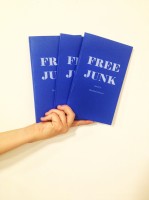 Free Junk
Free Junk
by Rachel Jensen
Snoot Books
$10 / Buy from Snoot Books
Perhaps the most recent tie between humor and gloom is the suicide of Robin Williams. Yet, the examples are plenty: comedian Mitch Hedburg—”My fake plants died because I did not pretend to water them,” was reported dead due to drug overdose; addiction invariably traces to depression. Sarah Silverman jokes about her ups and downs, “I am diagnosed with not having enough insanely-addictive drugs coursing through my body.” Maria Bamford, Google her. And Shakespeare, that guy, he divided his mojo between comedy and tragedy. I think of this waltz of contrasting sentiments when I read Rachael Jensen’s chapbook, Free Junk. Jensen’s poems can be comically-surreal and bearers of realistic insight. She provides details that make me want to laugh-weep. Ironic, romantic, yucky, naive, searching—she’s got as many voices as a self-help hotline on Valentine’s Day night.
For starters, Free Junk allows itself the liberty to be bizarre. Despite whatever “junk” the poems begin with, they have confidence that they will end up somewhere meaningful or at least where they need to go. Here is a list of first lines:
in a bush: Levi’s classic fit denim,
Once, a stranger sent me a message on the Internet
to tell me she dreamed I gave birth to a kitten. I responded,
I like marshmallows over an open flame.
I heard ‘toaster dream’
We begin with found, odd and banal things, sometimes misunderstandings. Whatever the particular point of entry, the peculiarity is fetching. I am intrigued to see where the poem could go, and Jensen manages to find her way: classic fit Levi’s washed and dried throughout the night become a drunken loneliness, self-satisfied and clad in “victim shorts”; an internet message about cat-birthing yields cat-water-holding which funnels into an inquiry regarding the nature of a priori knowledge. I think of another recently-dead person, Russell Edson, his surreal miniature fables. I also remember what a classmate told me once during a workshop: “It’s hip to include whatever you can in a poem.” That lady was right; it is hip to include gallbladder stuffed animals in poems, but as Mitch Hedburg once postulated, “Is a hippopotamus a hippopotamus, or just a really cool Opotamus?” Free Junk has the opotamus, too. The chapbook engages with the trend, but the poems are grounded by their odd specificity and drift into profundity.
Free Junk plays with romance, too. It romances, playfully. There is a brunette lament: READ MORE >
September 29th, 2014 / 10:00 am
I Loved You More by Tom Spanbauer
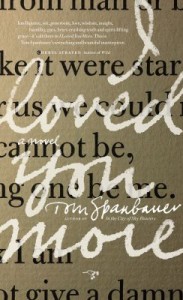 I Loved You More
I Loved You More
by Tom Spanbauer
Hawthorne Books, April 2014
468 pages / $18.95 Buy from Amazon or Hawthorne Books
I Loved You More by Tom Spanbauer starts with a slow burn, like an acid trip, of which there are a few in the book: There’s a preliminary period of seemingly aimless hanging out, and just when you start thinking nothing is going to happen, the room lights up, your heart lurches, and everything begins to glow.
Other writers have tried to quantify the transformation that occurs reading Spanbauer’s writing, the feeling of truth as opposed to artifice, the sense that now we’re really talking. The closest I can come is that it felt like letting air and light into a dark room. The book’s narrator, Ben Gruneberg says it much better, “When you get close to the vein that’s pulsing truth, when you open that vein, you can scrub your soul clean with the blood.”
Spanbauer is known for his truth-telling and open veins. He’s a gay writer and creative-writing teacher in Portland, Oregon, one of the gang of Portland writers of whom Cheryl Strayed and Chuck Palahniuk are the most famous, and Lidia Yuknavitch is the most beloved to me, personally. (Though, I don’t know if all these people are really a gang, or if that’s an outsider’s perception; I’m calling a Portland School, and assuming Spanbauer is a founder.) His Wikipedia entry says that he’s been living with AIDS since the 90s, and his AIDS book, In the City of Shy Hunters is a literary classic.
This latest novel, I Loved You More, published by Hawthorne Press in April 2014, is also a gay coming-of-age story, a living-with-AIDS story, and a story about male friendship, which seems to be mostly autobiographical. In it, Spanbauer’s alter ego, Ben Gruneberg—like Spanbauer, a writer and writing teacher with the same basic points of biography—chronicles his lifelong friendship with a straight male writer, Hank Christian, and the explosive end of that relationship. A bit of Google-digging will reveal a possible candidate for the real-life model of Hank.
On one level, it’s not a particularly dramatic story—a love triangle! featuring three writers! in Portland! and a pot of kale!—and how it all ends is mostly revealed on the first page. Moreover friendship is usually a side-story, not a main event, and devoting a book to the demise of one feels odd. The first section takes place in New York in the late 80s, when Ben and Hank are young writers at Columbia, studying under a fictionalized version of Gordon Lish, and their hanging-out, and the importance Spanbauer imbued it with, took a while to seize hold of me. And then it did.
Part of the alienation and then the magic is Spanbauer’s prose style, which is beatnik-ish in an old-fashioned way, using slang and refrains, a lot of fucking this or fucking that, man. His sentences are unconventional and fragmentary: “That old litany in this strange new place, how it made my heart stop.” Or this description of a leather bar: “In front of us, three men deep. Beyond, the bar is dark. Smoky dark. A foggy night, an ocean of men, dark waves. They have a sound, the waves, here and there bursts of pirate laughter, then no laughter.”
September 26th, 2014 / 10:00 am
25 Points: Mother of a Machine Gun
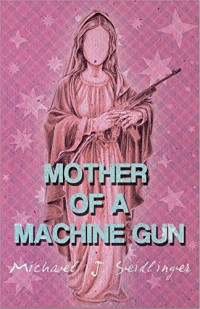 |
Mother of a Machine Gun
by Michael J. Seidlinger
Lazy Fascist Press, 2014
100 pages / $7.95 buy from Amazon
|
1. When I first read the title, I pondered the possibility of an automatic weapon being successfully birthed from a woman’s vagina. (Pretty sure your genitalia would never be the same.)
2. The writing style of Mother of a Machine Gun reminded me of some strange Dr. Seuss book I read as a child.
3. Michael J. Seidlinger is a fucked up Dr. Seuss.
4. Kind of wonder if Seidlinger’s mother has read Mother of a Machine Gun and whether or not she thought it should be “critically acclaimed.”
5. Pondered the economic and environmental costs of having so many one-line paragraphs.
6. To go along with point #5, probably should’ve put in pictures or something to fill in the vast amount of white space.
7. To go along with points #5 and #6, the vast amount of white space and one-line paragraphs make for a quick read. (Could be a positive or negative thing depending on whether or not you like the book.)
8. Mother of a Machine Gun is a story of denial.
9. Mother sucks at being a mother.
10. Mother probably shouldn’t be left to go on a crusade to find her son.
September 25th, 2014 / 4:30 pm
25 Points: The Road to Emmaus: Poems
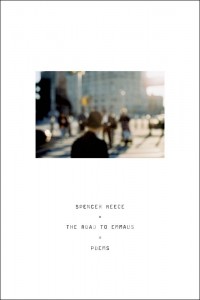 |
The Road to Emmaus: Poems
by Spencer Reece
Farrar, Straus and Giroux, 2014
144 pages / $24.00 buy from Amazon
|
1. I have always had a thing for men of God.
2. Spencer Reece is an Episcopalian minister. Do not let this turn you off. If you do, you will be doing yourself a great disservice. You will be denying yourself something sight unseen.
3. The priest at my father’s funeral was a radical one. His name was Father Pat, and he was a notorious IRA sympathizer. At the service, Father Pat was treated like a rock star. At his own funeral, my father was upstaged.
4. Reece did not become a minister until he was 48 years old. It took him eleven years to write the poems in The Road to Emmaus. I find this to be strangely reassuring; I always feel like I am rushing, trying to make up for lost time.
5. In 2010, Reece served at the only all-girl orphanage in Honduras, Our Little Roses, in San Pedro Sula. San Pedro Sula is the murder capital of the world. At a reading from this book that I attended last week, Reece told a story of a friend’s attempt to raise money for the orphanage from a wealthy benefactress. The woman agreed to make the donation, saying, “How else will Honduras get its maids and prostitutes?”
6. A year after my father’s death, Father Pat was arrested for laundering money for weapons to the IRA.
7. The Road to Emmaus refers to a story in the Gospel of Luke where Jesus makes an appearance to two of his disciples as they leave Jerusalem for the city of Emmaus, two days after Jesus’ crucifixion. The two disciples are leaving Jerusalem, perhaps for good, because of the events surrounding Jesus’ death. A man appears to the disciples on the road; he does not identify himself, and the disciples don’t recognize him. Instead, as he walks with them, the man corrects their misinterpretations about what has transpired; telling them it was all in line with God’s plan. Still not recognizing the man as Jesus, the disciples invite him to eat with them. Later, when they finally recognize him as Jesus, he disappears.
8. Reece describes himself as coming to religion “tentatively.” He told the Poetry Society of America that he feels a connection to T.S Eliot, who was also devout. Like Eliot, many of Reece’s poems mix verse with prose. “When I try to write, his example is never far from my mind. At times, I’d like to think I am in conversation with him,” Reece has said.
9. I have dreamed in lyrics from “Me and Julio Down by the School Yard.” And when the radical priest comes to get me released...I blame the Berrigan Brothers.
10. The story of Reece’s road to publication is oft-repeated. He wrote for over two decades, mostly alone, sometimes while living in farm house/ bird sanctuary in Minnesota, publishing only a handful of poems over that time. He sent out the manuscript for his first book of poetry, The Clerk’s Tale, to over 250 first- book contests without success. In 2003, he won the Bakeless Poetry Prize, judged that year by Poet Laureate Louise Glück. The title poem from The Clerk’s Tale was made into a short film by James Franco while Franco was a student at NYU. The poem is a story of the day in the life of Reece, and an older gay co-worker, as they go about their work day at a Brooks Brothers in the Mall of America.
September 23rd, 2014 / 1:56 pm
